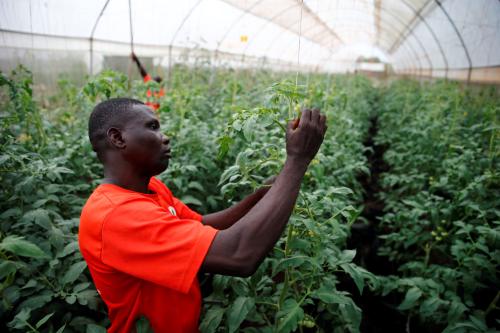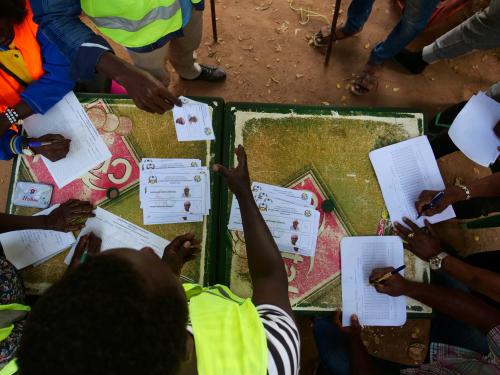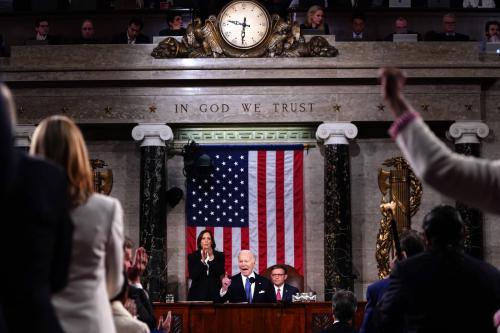Security and youth top agenda during US Assistant Secretary of State Nagy’s visit to Africa
On January 15, U.S. Assistant Secretary of State for African Affairs Tibor Nagy headed to Africa for a six-nation tour that included stops in the Central African Republic, Ethiopia, Kenya, South Sudan, Sudan, and Somalia.
Security was on the top of the agenda for the assistant secretary: In Juba, South Sudan, Nagy had some tough words for President Salva Kiir and rebel leader Riek Machar, who face an unlikely February 22 deadline for the formation of a unity government. “The elites need to get to the point of serving their own people instead of their own selfish interests. … The international community is sick and tired and fed up with providing the government services that the government of South Sudan should be providing for its own people,” he said.
In Khartoum, Nagy praised Sudan’s efforts to form a transitional government after the ouster of controversial President Omar al-Bashir. Sudan-U.S. relations have thawed in recent months, with Prime Minister Abdalla Hamdok’s December visit to Washington, D.C. and the announcement of an exchange of ambassadors.
Not all of Nagy’s discussions were about security, as many of the assistant secretary’s engagements focused on youth. During the trip, Nagy highlighted the University Partnerships Initiative, which supports higher education links that expose African students, faculty, and administrators to American campuses and fosters increased institutional collaboration between U.S. and African universities. He also celebrated the 10th anniversary of the Young African Leaders Initiative (YALI), a program that connects African youth leaders with their peers in the U.S. and across the continent. At Mekelle University in Ethiopia, he attended the inauguration of the American Corner, “a modern space for learning, discovery and collaboration aimed at developing and empowering Ethiopian youth and emerging leaders.”
In Somalia, Nagy met with Prime Minister Hassan Khayre as well as civil society representatives, alumni of Department of State public diplomacy exchange programs, and political figures to discuss security reform and economic development. Likewise, his visit to Bangui in the Central African Republic included discussions on both security and youth empowerment.
Nagy’s visit to Africa comes at a time of shifting U.S.-Africa relations, as U.S. Secretary of Defense Mark Esper announced this week that the U.S. is considering reducing its military presence in the Sahel. At the same time, the U.S. is looking to increase its commercial engagement in East Africa, and President Uhuru Kenyatta of Kenya will head to Washington, D.C. next week to discuss a bilateral trade deal.
Locusts put East African crops at risk
In one of the most severe locust outbreaks of the century, hundreds of millions of desert locusts are stripping crops bare across East Africa. The swarms have descended upon Kenya, Somalia, and Ethiopia, where the insects have consumed almost 100 percent of vegetation in some regions. Clusters of “unprecedented size and destructive potential” continue to devour corn, millet, and other crops in the Horn of Africa, where close to 20 million people already live with a high degree of food insecurity. Other nations—including South Sudan, Uganda, Egypt, Eritrea, and Yemen—are observing similarly high-risk conditions for locust breeding that could wreak havoc on the crop production of further areas of East Africa and the Middle East. The United Nations has requested $76 million immediately in order to curb the growing disaster.
Burundi’s ruling party selects new candidate for presidential election
On January 26, Burundi’s ruling party announced that it had chosen General Evariste Ndayishimiye to be its candidate for the country’s presidential election in May. He will compete against two opposition parties. This announcement means that President Pierre Nkurunziza will retire after serving three terms, the last of which was disputed as unconstitutional and sparked political violence that continues to this day. Nkurunziza’s influence could continue after the election; Ndayishimiye is a close ally of Nkurunziza and has served as the ruling party’s secretary-general.
Nkurunziza’s government has cracked down on the media ahead of the May elections, closing several local radio stations and media houses, and suspending broadcasts by Voice of America and the BBC. On what were called “trumped-up charges” by Amnesty International, on Thursday, January 30, a court sentenced four journalists to 2 1/2 years in prison on charges of attempting to undermine state security. The journalists are associated with Iwacu, one of few remaining private media organizations in Burundi.






Commentary
Africa in the news: Nagy visits Africa, locust outbreak threatens East Africa, and Burundi update
February 1, 2020